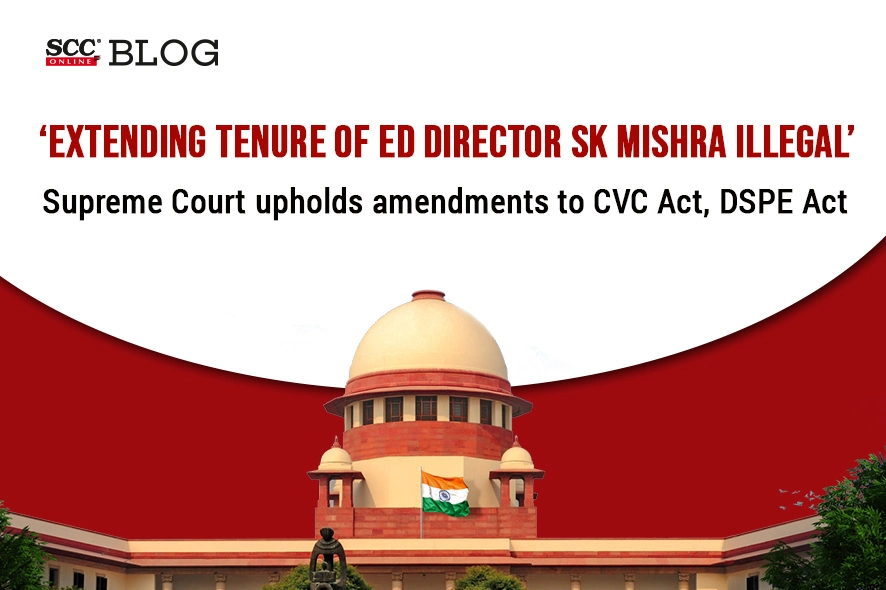Supreme Court: In a batch of writ petitions seeking to quash order dated 17-11-2021 passed by the Union to further extend the tenure of Enforcement Directorate (‘ED’) Chief Sanjay Kumar Mishra, the Bench of B.R. Gavai*, Vikram Nath and Sanjay Karol JJ. held the extension of the tenure of SK Mishra illegal and in violation of the Supreme Court’s judgment in Common Cause (A Registered Society) v. Union of India, 2021 SCC OnLine SC 687. However, the Court allowed him to continue with the post of ED Director till 31-07-2023 while considering the Union Government’s concern regarding peer review of international body Financial Action Task Force (‘FATF’) and smooth transfer of power.
In the case of Common Cause (A Registered Society) v. Union of India, the after upholding government’s decision to extend the tenure beyond 2 years. The Court had not struck down any law, but specifically issued mandamus that no further extension shall be granted to ED Director SK Mishra, which was binding on the parties. The Court through Om Parkash Agarwal v. Giri Raj Kishori, (1986) 1 SCC 722 clarified that “the said judgment cannot be said to be an authority to hold that by a legislative enactment, a writ of mandamus issued by this Court could be defused.” Thus, the Court held the orders dated 17-11-2021 and 17-11-2022 granting extensions to ED Chief SK Mishra not valid in law. However, considering the express concern of the Union regarding FATF review and process of appointing the Director of Enforcement likely to take some time, the Court permitted SK Mishra to continue to stay in the office till 31-07-2023.
While reiterating the power of judicial review, the Court relied on Asif Hameed v. State of J & K, 1989 Supp (2) SCC 364 and explained that “the role of the judiciary is to ensure that the aforesaid two organs of the State, i.e., the Legislature and the Executive function within the constitutional limits. Judicial review is a powerful weapon to restrain unconstitutional exercise of power by the legislature and executive. The role of this Court is limited to examine as to whether the Legislature or the Executive has acted within the powers and functions assigned under the Constitution. However, while doing so, the court must remain within its self-imposed limits.”
The instant petitions also challenged the validity of Central Vigilance Commission (Amendment) Act, 2021, the Delhi Special Police Establishment (Amendment) Act, 2021 and the Fundamental (Amendment) Rules, 2021.
The Court referred to Vineet Narain v. Union of India, (1998) 1 SCC 226 wherein, the Court found the need for “insulation of the investigating agencies like the CBI and the Revenue Department from any extraneous influence to enable them to discharge their duties in the manner required for proper implementation of the rule of law.” The Court pointed out that the two amendments to CVC Act and DSPE Act provided that the period for which such Director holds office during initial appointment may in public interest and on written recommendation of Committee with reasons be extended up to 1 year at a time, restricted to completion of 5 years.
The Court relied on Binoy Viswam v. Union of India, (2017) 7 SCC 59 to conclude that a statute enacted by the Parliament or State Legislature could not be declared unconstitutional lightly, and the Court must be able to clearly hold glaring violation of constitutional provisions due to which, legislative provision being challenged could not stand.
The Court raised an important aspect that “When a committee can be trusted with regard to recommending their initial appointment, we see no reason as to why such committees cannot be trusted to consider as to whether the extension is required to be given in public interest or not. At the cost of repetition, such Committee is also required to record reasons in writing in support of such recommendations.”
The Court observed that there was statutory safeguard insulating the office of Central Vigilance Commissioner and Vigilance Commissioner from extraneous pressures and permits them to act independently, and the appointment or extension of tenure of ED/CBI Director is made only after recommendations of a committee chaired by the Prime Minister with Leader of Opposition and Chief Justice of India being the members. It was clear that it is not at the sweet-will of the government to grant extension to such offices. The Court upheld amendments to Central Vigilance Commission Act, 2003 and the Delhi Special Police Establishment Act, 1946 allowing the Central Government to extend the tenure of heads of ED and Central Bureau of Investigation (‘CBI’) 1 year at a time and up to 5 years.
[Jaya Thakur v. Union of India, 2023 SCC OnLine SC 813, decided on 11-07-2023]
Judgment authored by: Justice B.R. Gavai






